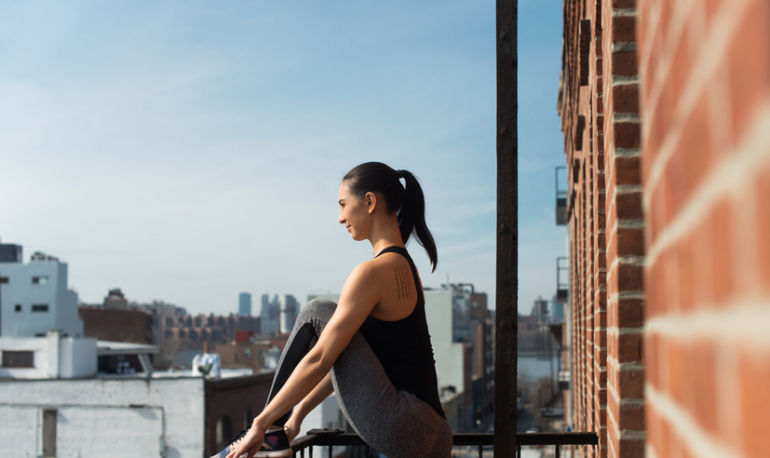1. Climate change threatens our food supply.
2. Temperature extremes aggravate chronic conditions.
3. Catastrophes from extreme weather events are psychologically damaging.
4. Climate change is taking a toll on our mental health.
5. Air pollution worsens asthma symptoms.
6. Poor air quality threatens outdoor exercise routines.
7. More CO2 means less protein.
8. Pollutants are particularly dangerous during pregnancy.
9. Climate change disproportionately affects women—especially in developing countries.
10. Extreme heat is linked to violent crime.
11. Climate change fast-tracks water-related illnesses.
12. Extreme weather events are super dangerous.
We all know that the effects of global warming threaten our natural environment, and it turns out they're not so great for us either. The pollutants in our air and water supplies—and the extreme weather events that they're spurring—pose a distinct threat to human health.
According to an assessment by the World Health Organization, climate change is expected to cause approximately 250,000 additional deaths per year between 2030 and 2050. No wonder health insurance companies are starting to designate resources to limit global warming. "We know that there are certain things climate change-related that ultimately can impact someone's health," Kyle Cahill, the director of sustainability and environmental health at Blue Cross Blue Shield, told Yale researchers. "Ultimately we know [measures that curb climate change] will benefit all of us in the health care system broadly because people will become healthier."
The more we learn about the connection between the health of the earth and our bodies, the more we realize they're really one and the same. Here's what the research says about the unexpected dangers of climate change; may they motivate us to start living a little bit greener each day.
For starters, the rising temperatures, heat waves, droughts, floods, and winter storms associated with climate change make it more difficult to grow fan favorites like coffeeand avocado. They can also increase the likelihood of food spoilage and contamination.
High temperatures raise the level of ozone pollution in the air that exacerbates respiratory disease. Prolonged exposure to high temperatures is also associated withincreased risk of hospitalization for cardiovascular-, kidney-, and diabetes-related conditions.
The wildfires, floods, and droughts associated with climate change can negatively affect people's finances, and according to the Union of Concerned Scientists; they also have "less obvious toll on the human psyche." People coping with the loss of a home, business, or farm can suffer severe mental health symptoms, including PTSD.
Even if you're not directly affected by climate change, it probably still bums you out. That's why some people who study climate change for a living report significant depression about their job and why "climate anxiety programs" are now a thing.
One study on young campers with moderate to severe asthma found that they were 40 percent more likely to have acute asthma episodes on high pollution summer days than on days with average pollution levels.
The CDC now recommends that people limit their outdoor exercise during high-pollution days.
Elevated CO2 levels have actually been shown to increase the concentrations of carbohydrates and reduce the concentrations of protein and essential minerals in plants. And we all know that a high-carb, low-protein diet is a no-no.
Babies who are exposed to urban air pollutants from fossil fuels in the womb are more likely to develop anxiety or depression later in life.
Evidence from developing countries suggests that women are more likely to go without food and water in times of shortage. According to the Rainforest Alliance, extreme weather events also affect women in poorer countries more than men: "Tasked with finding water, fuel wood, and food, women are roving farther to meet basic household needs as droughts and floods bring unexpected and violent changes to vulnerable landscapes. And women tend to be poorer, limiting their options for action in a drought, flood, or other extreme weather scenario." Plus, warming temperatures pave the way for tropical diseases like Zika, which primarily strikes pregnant women and their unborn babies.
Studies show that aggression, violence, and international crime are more common in hot regions. One explanation for this phenomenon is the General Aggression Model, which posits that being hot is uncomfortable and irritating, and irritated people are more likely to act violently or aggressively toward others. Another suggests that people who live in consistently warm temperatures are not as inclined to plan for seasonal change and thus less likely to act with regard to the future, which results in a lack of self-control.
In developing regions, more varied rainfall patterns can threaten fresh water supply and increase the risk of diarrheal diseases, which already kill approximately 760,000 children under the age of 5 every year. In more developed countries, industrial chemicals in water supplies can contaminate shellfish supplies.
Thanks in large part to climate change, the number of reported weather-related natural disasters has more than tripled since the 1960s. Every year, these disasters result in over 60,000 deaths.
Don't let this research make you retreat to that doomsday shed. Instead, take it as a reminder that you should protect the planet's health just like you do your own. Get started by committing to these sustainable promises and working these green actionsinto your everyday routine. Remember that it's not all doom and gloom—we can all make a real difference.
This piece was co-written by mbg's associate health editor, Gretchen Lidicker.

















Đăng nhận xét